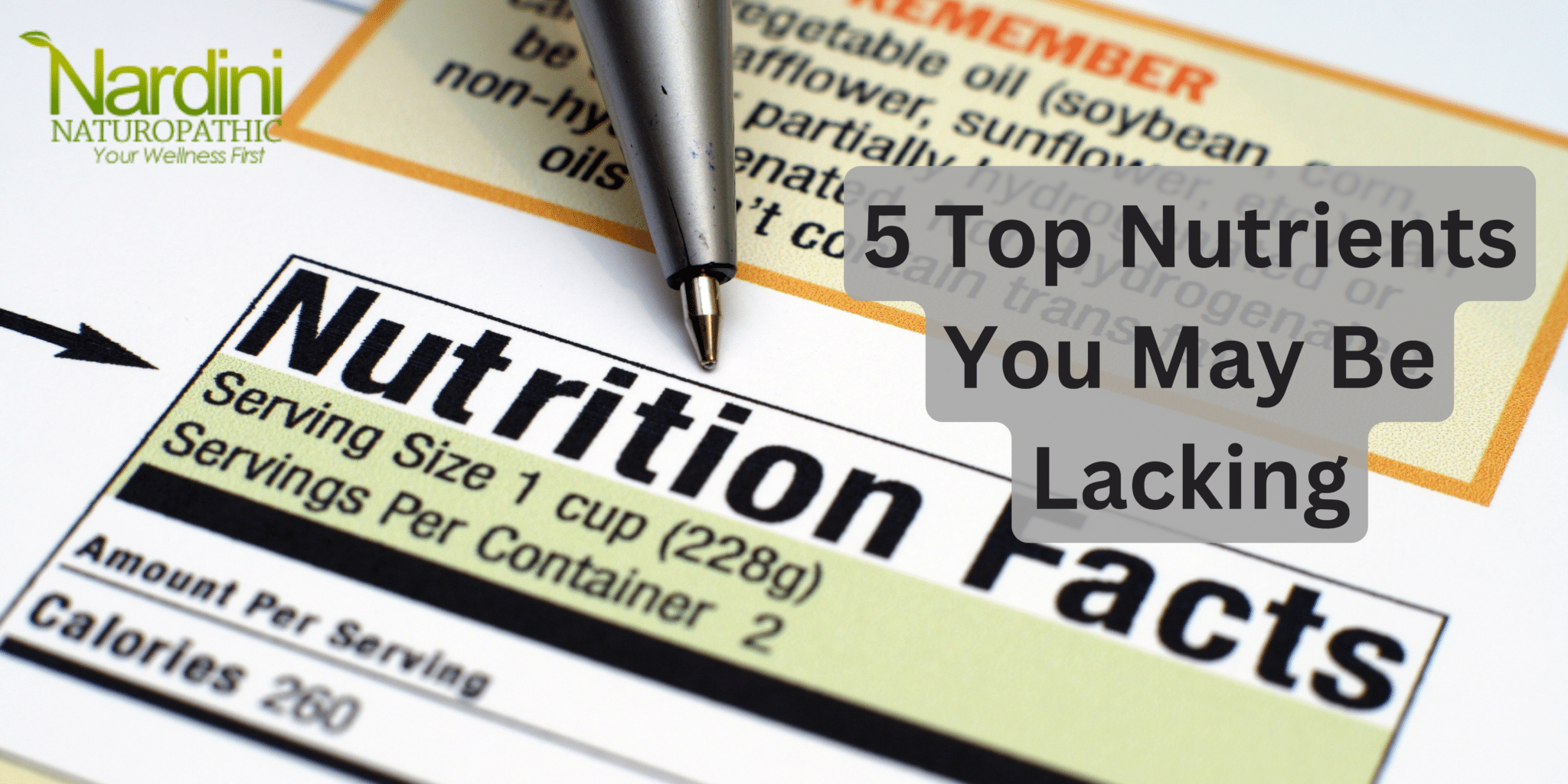Malnutrition is a state of the body in which essential nutrients are deficient. These nutrients include macronutrients, like protein, fat, and carbohydrate, and micronutrients, such as vitamins and minerals.
A common reason for this is insufficient dietary intake. This can be due to many factors, including anxiety, depression, eating disorders, addictions, and, of course, poverty. Not eating enough food for any reason can eventually put one in a state of malnutrition.
However, good nutrition is more than just getting enough to eat.
Being able to digest and absorb the food we eat is another crucial element in maintaining healthy nutrition. An unresolved digestive disorder can make it very difficult to absorb nutrients even if they’re present in the food.
It is also extremely common, especially in western societies, for diets to consist largely of foods that are calorie-rich, but nutrient-poor.
A perfect example of this is “fast-food”. Anyone who has read the book Good Omens will remember that one of the four horsemen of the apocalypse, Famine, is a fast-food restaurant chain owner1.
It doesn’t require eating at fast food restaurants to eat low nutrition food, though. Consuming prepared, packaged, and processed meals at home can have the same effect.
Eating a limited diet, due to food intolerances, for example, can also lead to deficiencies in some nutrients.
So, even when we’re getting enough food, it’s still possible to develop a nutrient deficiency.
Which ones must we look out for the most?
5 Common Nutrient Deficiencies
The first thing to understand is that not everyone will have the same nutrient deficiencies, if any. Although an individual can be deficient in almost any nutrient, it’s the micronutrients that are often missed.
Micronutrients include vitamins and minerals which are required in relatively small quantities compared to the macronutrients. Some of our micronutrients may not always be at optimal levels in the body either because we’re not taking in enough or we’re not absorbing them adequately.
Let’s have a look at a few vitamins and minerals that are among the most common to be deficient in.
1. Vitamin D
Most of us are aware that Vitamin D is important for your bones. It’s required for both children’s bone development as well as maintenance of healthy adult bones. Low Vitamin D can result in poor quality, fragile bones.
Vitamin D is also important for mood, brain function, and maintenance of a healthy immune system. In fact, low levels of this nutrient have been associated with autoimmune conditions, such as multiple sclerosis (MS)2.
Many are not aware that it’s extremely easy to become deficient in Vitamin D, particularly in northern climes. It’s estimated that up to 90% of Canadians have deficient blood Vitamin D levels at less than 75 nmol/L. When I test people in my practice, unless they are supplementing with Vitamin D, their levels are almost always either in the low end of the “normal” range or they are deficient.
The good news is that it’s usually straight forward to get the Vitamin D levels up if you need to and you know about it. A simple blood test can detect a deficiency.
The best way to get Vitamin D is from the sun. Your body uses the UV rays from sunlight to convert cholesterol in the skin into Vitamin D. However, in most of Canada and the northern US states, there is only enough sunlight to make sufficient Vitamin D over 4-5 months of the year (roughly mid-May to mid-October). During these months, 20 minutes a day of sun with arms and legs exposed and no sunscreen is enough for many people.
For the rest of the year, supplementing with Vitamin D is usually a good idea. Doses start at 1000 international units (IU) or 25 micrograms per day for adults, but more may be required for those with extremely low levels.
Beware that more is not always better. Too much Vitamin D can be harmful. Get your Vitamin D checked periodically to ensure that you’re not overdoing it.
2. Iron
This common mineral is required to carry oxygen from the lungs to the various cells of the body.
Red blood cells are filled with a protein called hemoglobin, which contains a molecule known as heme. At the centre of each heme molecule is an iron atom which is capable of binding to oxygen.
If iron levels become low, then there is less hemoglobin to go around and, therefore, less oxygen can be carried through the body. Oxygen is needed by most cells to generate enough energy. That’s why the most obvious symptom of iron deficiency is fatigue.
Other signs and symptoms of low iron include paleness, hair loss, deformed nails, and sensitivity to cold.
Although not as common as Vitamin D insufficiency, iron deficiency is also a concern. A study published in 2023 estimated that 7% of the population should be considered iron deficient3. Deficiency of iron was found to be most prevalent in females of reproductive age (as high as 21% in 14-18 year-olds).
Blood iron levels are easily tested, and the number and health of the red blood cells can also help confirm iron deficiency.
Heavy menstrual periods can certainly deplete iron levels, but not getting enough in the diet may also contribute.
The best sources of iron are from animal sources, especially beef, pork, poultry, and liver, because they contain iron already bound to heme. Vegetarian sources of iron, like spinach, beans, pumpkin seeds, and blackstrap molasses, are less easily absorbed.
If you’re considering a supplement, iron glycinate is one of the best absorbed forms, as is iron contained in heme, both of which are available in capsules.
Absorption of iron does depend on sufficient acid production in the stomach. If you’re experiencing heartburn or other digestive symptoms, talk to a qualified health practitioner about assessing your stomach acid levels.
As with Vitamin D, too much can be a bad thing. Don’t supplement with iron before first getting your levels tested to find out if you are low.
3. Vitamin B12
This B vitamin is essential to healthy red blood cell formation and for nerve transmission. Low B12 often leads to symptoms of fatigue, light-headedness, numbness and tingling, anxiety, depression, irritability, and sleep disturbances.
According to a review in 2014, deficiency in Vitamin B12 is only about 6% in adults under 60, but the estimate grows to approximately 20% in those over 60 years of age4. The percentage of people with non-deficient but sub-optimal Vitamin B12 is likely to be considerably higher.
It’s extremely easy to become deficient in Vitamin B12 because it depends so much on your ability to absorb it. A protein, called Intrinsic Factor (IF), which is produced in the stomach, is required to absorb Vitamin B12 in the intestines.
IF production mirrors acid production in the stomach, so the two tend to be low in tandem. Because of this, people who are low in iron often have suboptimal or deficient B12 levels.
There is an easily accessible blood test for Vitamin B12 that can be done at the same time as an iron test.
Dietary Vitamin B12 is primarily obtained from animal sources. These include fish, poultry, red meat (especially liver), eggs, and dairy products.
The Recommended Daily Intake (RDI) for Vitamin B12 is only about 2.5 micrograms per day. If you are not already deficient and your digestive system is working well, a diet that includes moderate amounts of meat is often sufficient.
If you have been diagnosed with severely deficient B12, however, you may need to have periodic B12 injections.
For milder deficiency or sub-optimal levels, an oral Vitamin B12 supplement may be adequate. In such cases, 1000 micrograms per day is usually enough to restore normal levels. Check with practitioner for specific advice on dosage.
Oral B12 supplements that are sublingual (under the tongue) are usually much better absorbed than standard capsules.
4. Magnesium
Magnesium is another essential mineral whose major role is in the function of enzymes, which are protein molecules needed for metabolic processes that keep you alive and well.
Alongside this important purpose, magnesium is required for development and maintenance of healthy bones, energy production, maintaining healthy blood sugar and blood pressure, facilitating muscle relaxation, aiding nerve transmission, promoting sleep, and helping the body to manage the effects of stress.
Magnesium deficiency is quite common, with more than a third of Canadians over age 19 falling below the estimated average daily requirement5.
Detecting a deficiency in magnesium can be done with a blood test. The standard test for blood magnesium is not very accurate for detecting an overall deficiency in the body, since only about 1% of the body’s magnesium is in the blood. The red blood cell (RBC) magnesium test is much more reflective of the body’s magnesium levels.
Poor digestion notwithstanding, adding more magnesium to the diet is not that difficult.
Some of the best food sources of magnesium include nuts and seeds, legumes, dark green leafy veggies, broccoli, artichokes, meat, dairy products, and whole grains.
For those with weak digestive systems or with diets that lack sufficient magnesium, a supplement may be necessary to correct a deficiency.
Although there are many forms of magnesium, the most absorbable ones in capsule form include magnesium glycinate, magnesium malate, and magnesium L-threonate. Doses usually start at 200-400 mg per day.
Although magnesium is generally considered very safe to take, it can interact with some medications and too much may cause diarrhea.
5. Iodine
Iodine is a nutrient required by the body to manage thyroid hormone levels. In fact, it’s a key component of T3, T4, and other thyroid hormones. It is also very important for breast, ovarian, and digestive health and may have an anti-cancer effect.
Deficiency of iodine is a major problem worldwide. It’s estimated that 35-45% of the world’s population is iodine deficient6.
Some of the signs and symptoms which could indicate that you’re not getting enough iodine include goiter (an enlarged thyroid), weight gain, difficulty concentrating, fatigue, feeling cold, hair loss, and depression.
Testing for iodine deficiency is best done with a urine test. It can be performed with or without iodine challenge (taking a large dose of iodine before the test to detect if the body is absorbing or excreting the iodine).
Your body can’t produce iodine on its own, so you must get it through your diet. The RDI for iodine is 150 micrograms.
Good sources of iodine include seafood, seaweed (like kelp and dulse), eggs, and navy beans.
If you need an iodine supplement, the most common format is as a capsule of potassium iodide. This is suitable for lower dose treatment of thyroid-related issues. If you require larger doses, Lugol’s solution delivers higher amounts of both iodine and iodide, the two forms of the nutrient that the body requires7.
Although many people can tolerate relatively large doses of iodine, be aware that too much can lead to symptoms such as nausea, vomiting, diarrhea, rapid heart rate, and anxiety.
What To Consider With Nutrient Deficiencies
Vegan and some vegetarian diets tend to be low in absorbable iron and Vitamin B12.
Many grains and vegetables contain phytates and oxalates that can bind to minerals like iron and magnesium to make them less well absorbed.
So, it’s especially important that you monitor your levels of these nutrients if animal products are low or absent from your diet.
Fermented and sprouted vegetables contain more easily absorbed nutrients and taking apple cider vinegar or lemon water before meals can help with vitamin and mineral absorption.
I can’t stress enough how addressing any digestive difficulties is critical to maintaining optimal nutrition.
If you suspect that you may be low in a particular nutrient, get tested.
If you’re found to have borderline low or mildly deficient levels of a nutrient, first consider adding foods that naturally contain that nutrient to your diet.
For moderate to severe deficiencies, consider supplementing. As usual, check with your practitioner for appropriate dosing, especially if you are taking any pharmaceutical medication.
Remember that correcting deficiencies and maintaining good nutrition is a key to a long and healthy life!
- https://en.wikipedia.org/wiki/Good_Omens
- https://journals.aai.org/jimmunol/article/177/9/6030/1650/IL-10-Signaling-Is-Essential-for-1-25
- https://www.sciencedirect.com/science/article/pii/S0022316623354804
- https://pubmed.ncbi.nlm.nih.gov/25189324/
- https://www.canada.ca/en/health-canada/services/food-nutrition/food-nutrition-surveillance/health-nutrition-surveys/canadian-community-health-survey-cchs/canadian-adults-meet-their-nutrient-requirements-through-food-intake-alone-health-canada-2012.html
- https://www.ncbi.nlm.nih.gov/pmc/articles/PMC9459956/#:~:text=Iodine%20is%20one%20of%20the,45%25%20of%20the%20world’s%20population.
- https://en.wikipedia.org/wiki/Lugol’s_iodine
Book An Appointment With Nardini Naturopathic
Are you interested in finding out if you have a nutrient deficiency?
Or perhaps you’d like a review of your overall diet to see where you could be doing better.
Maybe you have food allergies or intolerances and worry you aren’t getting enough nutrients because of your restricted diet.
I’m Dr. Pat Nardini, a naturopathic doctor who offers nutritional counseling services to help ensure all of those gaps in your diet are filled, and that you’re getting enough of all the important nutrients which your body needs to function at its best.
Contact me today for more information, or book a free 15-minute consultation where I will help you understand how naturopathic medicine can help you.
If you have questions about naturopathic medicine, or you’d like to take your first step into the world of naturopathy, contact us at Nardini Naturopathic, and let’s book an appointment.
Yours in health,
Dr. Pat Nardini, Naturopathic Doctor
320 Danforth Ave suite 206,
Toronto, ON, M4K 1N8
-https://g.page/NardiniNaturopathicDanforth
Dr. Pat Nardini, ND is a licensed doctor of naturopathic medicine in Toronto, Ontario. He offers science based natural health solutions with a special focus on thyroid conditions.


